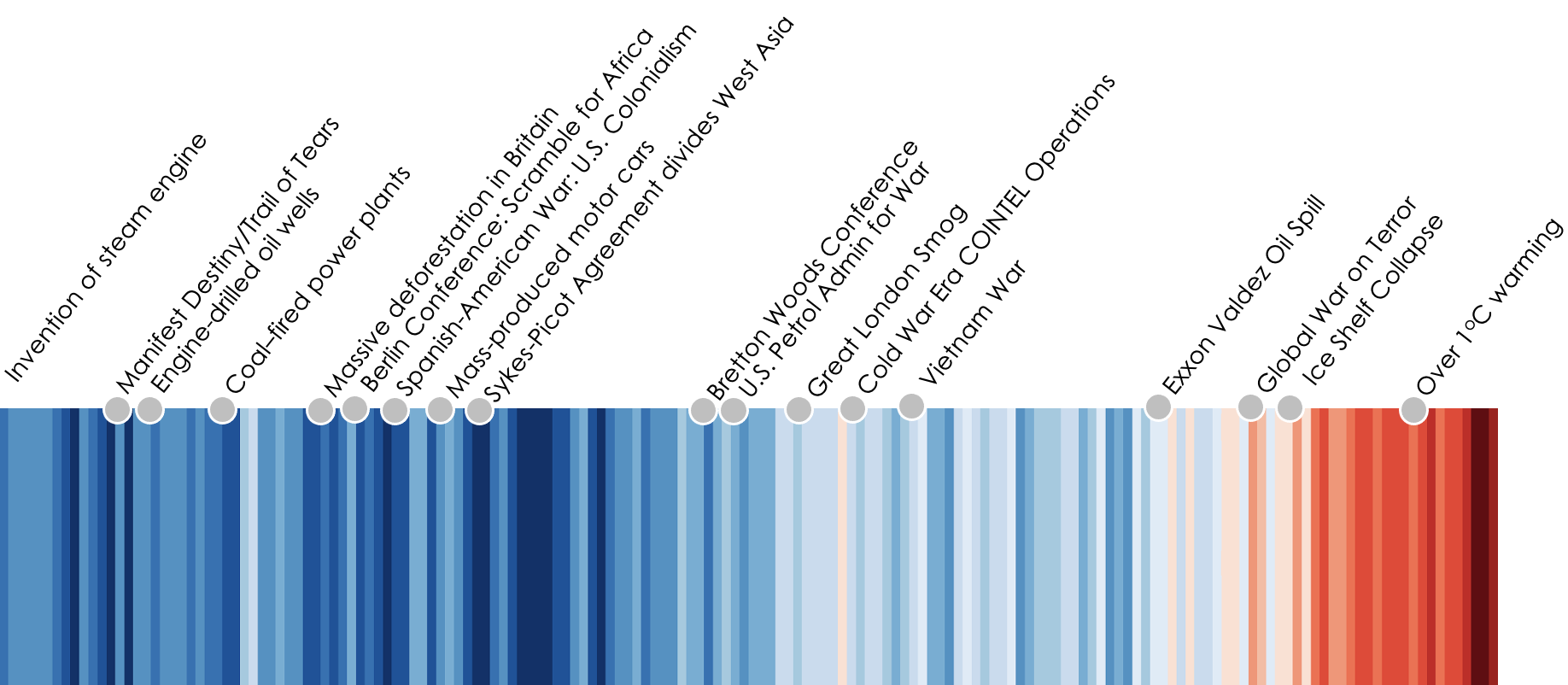Climate Change: A Symptom of Anti-People Governance
 .
.
 .
.
Industrial processes using fossil fuel combustion as energy sources have increased the concentration of atmospheric greenhouse gasses, resulting in an increase in global average surface temperature by about 1.2°C over the 1850-1900 period1. The Intergovernmental Panel on Climate Change (IPCC), the United Nations body for assessing the science related to climate change, asserts that climate change is unequivocally caused by human activity, principally through the emissions of greenhouse gasses. Global governance interventions are falling far short of what is needed to address the disproportionate impacts of climate change, particularly when considering that anti-people governance is causing climate change.
The IPCC cites colonialism as a cause of climate change1, but neglects to include any analysis taking this into account. The report acknowledges that carbon emissions of a country might be due to production of goods intended for trade, but this must be emphasized. Colonialism leads to import-dependent, export-oriented economies. For instance, though the Philippines is well suited to rice growing, it imports $249 million worth of rice annually2 due to foreign intervention. Shouldn’t these emissions be attributed to the imperialist colonial nations?
Another key aspect to understand is the disproportionate contribution to climate change. Climate change is caused primarily by the most economically advantaged. For example, the 10% of households with the highest incomes contribute about 40% of global consumption-based household GHG emissions, while the bottom 50% contribute about 15%1. These numbers highlight the fact that economic inequality is the primary factor in driving environmental injustice. However, the focus on household contributions and carbon footprints, while illuminating, obfuscates the importance of production-based contributions like energy, industry, transportation, and land use, driven by corporations and the growth-based economic system.
Women and children are particularly vulnerable to the impacts of climate change3. Reasons for this include: women’s lack of access and control of assets and resources such as land, markets, and technologies; women’s concentration in low-wage casual employment; and women’s limited representation and power in decision making processes. Climate change and related disasters are pushing the most vulnerable groups further precarity with some estimates that up to 132 million additional people will be pushed into extreme poverty by 20304. According to the UN, 70% of people living in poverty are women. 50-80% of food production workers are women but they own less than 10% of the land. Climate change is a ‘threat multiplier’, which exacerbates social, political, economic tensions, leading to women and girls facing increased vulnerability to gender-based violence.567
What can we do about the uneven, gendered impacts of climate change? As a first step, we can recognize that the government response of relying on market-driven green innovation and technological solutions falls woefully short and should be classified as anti-people governance. Adaptation and mitigation initiatives must prioritize women’s needs5, as they are on the front lines of addressing climate change as well as feeling its impacts. Moreover, climate change is a form of systemic violence with unjust impacts. If colonization is a key cause, we must resoundingly advocate for decolonization as a solution.
-
IPCC, 2023: Summary for Policymakers. Climate Change 2023: Synthesis Report.Contribution of Working Groups I, II and III to the Sixth Assessment Report of the Intergovernmental Panel on Climate Change [Core Writing Team, H. Lee and J. Romero (eds.)]. IPCC, Geneva, Switzerland, pp. 1-34. ↩ ↩2 ↩3
-
OEC. Mar. 2024. “Rice in Philippines.” The Observatory of Economic Complexity. ↩
-
Nesbitt-Ahmed, Zahrah. 2023. “How Gender-responsive Age-sensitive Social Protection is Related to the Climate Crisis”. UNICEF. ↩
-
Jordan, J.C., Abhilashi, R. and Shaheen, A. 2021. Gender sensitive social protection in the face of climate risk: A study in Uttar Pradesh, Rajasthan, and Madhya Pradesh, India. IIED Working Paper. International Institute for Environment and Development. ↩
-
UN Climate Change News.10 June 2022. “New Report: Why Climate Change Impacts Women Differently Than Men.” United Nations Climate Change, UNFCCC. ↩ ↩2
-
UN Women. 2022. “Explainer: How Gender Inequality and Climate Change Are Interconnected.” UN Women. ↩
-
Osman-Elasha, Balgis. 2009. “Women…in the Shadow of Climate Change.” United Nations Chronicle, United Nations. ↩